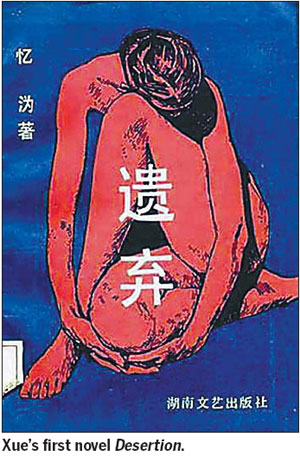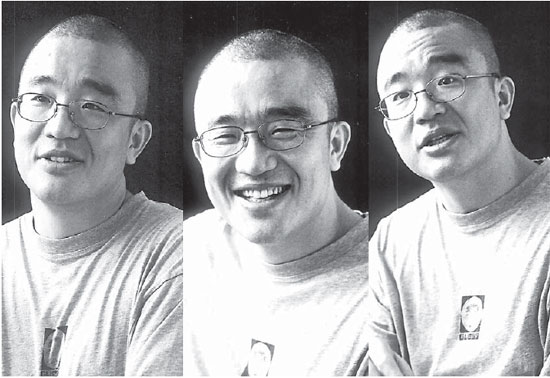Novel ideas
Updated: 2013-01-22 05:45
By Zhu Yuan (China Daily)
|
||||||||
|
Xue Yiwei enjoys increasing popularity among readers and he hopes his fiction works help readers think about life from a new perspective. Photos by Qin Ying / For China Daily |
Some fiction works we read and forget. Others, like Xue Yiwei's, make us think past the last page. Zhu Yuan digs deeper.
Fiction writer Xue Yiwei says he pursued immortality by writing - and constantly rewriting - his books. The 49-year-old is obsessed with the notion that fiction is a special way of deepening his and readers' insights into the essence of life. Xue also believes the Chinese language is rich and limitless, and able to present fiction writers' perceptions.
The peculiar and dramatic fate of his first novel, Desertion, over the past two decades proves this, he believes.
The book is hailed for demonstrating the use of Chinese to present thought-provoking stories - Xue's way of seeking immortality.
Desertion is about an amateur philosopher and was first published in 1989. Xue estimates no more than 15 people read it in the first eight years.
Then, suddenly, glowing reviews by critics and academics led to the 1999 publication of second edition, which was a hit. A revised edition published last May was also well received.
Xue believes the renewed attention to his work owes largely to an intellectual shift in how people view themselves and the world.
Many professors and government employees quit their jobs to join the growing private sector in the 1990s. The buzzword from the era is xiahai - "jumping into the sea of business".
Xue believes Desertion didn't do well during this period because people were too focused on making money to read.
In Xue's novel, hero Tu Lin goes against the tide of the time. Although Tu chooses to quit his job as a government employee and even deserts his family, he does not xiahai. Instead, he lives as a hermit because he can't adapt to the world's chaos and feels ostracized.
Xue describes a writer as a slave to the language he uses and a waiter serving his books' protagonists.

Desertion is almost like an autobiography. Xue uses Tu to express his attitude toward writing.
The experiences and perspectives of Xue's 20s are evident in Tu. Like Tu, Xue deserted normal life to retreat into his own world of writing.
Many writers, such as Ernest Hemingway (1899-1961) and Chinese literary critic and scholar Wang Guowei (1877-1927), committed suicide when they couldn't accept reality.
Tu feels writing makes the impossible possible.
Language is a writer's only barrier, he believes.
Literary critic Liu Zaifu categorizes Xue's novels as "cold literature" compared to those by China's literary Nobel laureate Mo Yan.
Writers like Mo Yan show motivation and passion, while those like Xue demonstrate life's absurdities. Xue deals with a sense of not belonging.
For example, in Desertion, Tu's boss describes the department's work as very hectic and always seems busy.
But the hero's experience tells him there isn't much to do in the office.
Tu realizes his superior isn't lying when he says he's busy.
The tragedy is his illusion about his meaningless work's importance and that his busyness justifies his existence.
All of Xue's works contain similar philosophical ponderings.
Xue has published five books in the past year. He says he hopes his readers will think about life from a new perspective after reading his works.
Contact the writer at zhuyuan@chinadaily.com.cn.
(China Daily 01/22/2013 page19)

 In Photos: 7.0-magnitude quake hits Sichuan
In Photos: 7.0-magnitude quake hits Sichuan
 Li Na on Time cover, makes influential 100 list
Li Na on Time cover, makes influential 100 list
 FBI releases photos of 2 Boston bombings suspects
FBI releases photos of 2 Boston bombings suspects
 World's wackiest hairstyles
World's wackiest hairstyles
 Sandstorms strike Northwest China
Sandstorms strike Northwest China
 Never-seen photos of Madonna on display
Never-seen photos of Madonna on display
 H7N9 outbreak linked to waterfowl migration
H7N9 outbreak linked to waterfowl migration
 Dozens feared dead in Texas plant blast
Dozens feared dead in Texas plant blast
Most Viewed
Editor's Picks

|

|

|

|

|

|
Today's Top News
Live report: 7.0-magnitude quake hits Sichuan, heavy casualties feared
Boston suspect cornered on boat
Cross-talk artist helps to spread the word
'Green' awareness levels drop in Beijing
Palace Museum spruces up
First couple on Time's list of most influential
H7N9 flu transmission studied
Trading channels 'need to broaden'
US Weekly

|

|








